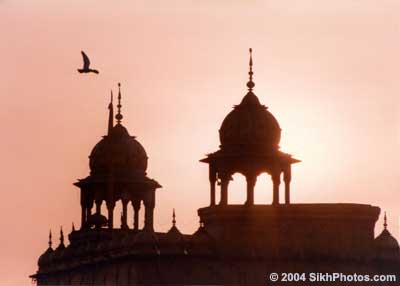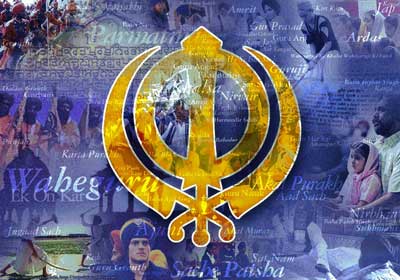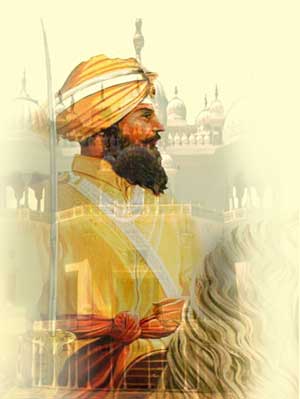Twenty Years Later
Milestones on the Path to Peace
June 6, 2004. Twenty years after 1984 – the world has changed.
In this post September 11th environment,
Sikhs around the world are trapped in issues of mistaken identity.
Whether it is hate crimes in the streets of New York or France passing
legislation to bar religious minorities, including Sikh youth, from
wearing their turbans to school – the Sikh identity has become a global
issue. We are once again being challenged – this time to become known
and respected on a global scale. Ultimately, this challenge is about
the Sikhs getting to know themselves, and helping others understand and
overcome misconceptions about who Sikhs are. This is the fight we face
today. This is our 1984.
To face what is happening in our world now, we must let go of the past.
Forgiveness and The Promise of Democracy
Oftentimes, our remembrances make it
difficult to move. The hurt, the pain, the betrayal are very real. Yet,
these components can hold us back. We need to develop an ability to
move on. Do not mistake forgiveness with forgetting. The noble Sikh is
always one who forgives as it is so written and commanded to be
practiced. We remember the past in order to learn the lessons, but not
wallow in the pain or grief forever. However, if we focus only on the
remembering and not the forgiveness, then we doom ourselves to
ignorance. And clearly, ignorance is not what the whole Sikh ethos is
about.
It is time to learn the lessons of
democracy. Democracy is power in action – not of a few, but of all. It
gives every constituent a chance to use their voice, to use their
power. In the United States, in England, in Canada, in France, in
Germany – the rights of the Sikhs will be protected to the extent that
the Sikhs become actively involved in the political process. The rights
of Sikhs will be upheld in proportion to Sikh participation in
governance. So it is with India, and this is why we are saying - 20
years after 1984 - it is a very different world. Twenty years after
1984, there is a Sikh man, Dr. Manmohan Singh, who is known worldwide
as the economic savior of India and he has just become Prime Minister
of a country with over one billion people. A Sikh now leads the world’s
largest democracy.
Democracy is by no means perfect and
there are always tensions playing out between different parties. But it
does work. History has shown us that, in the long run, democracy works
as a method of peaceful self-governance for diverse groups of people.
Democracy is actually Sikhism in practice. Just look at the rule of
Maharajah Ranjit Singh. Can one believe the diversity he sought? Can
one see his tolerance of all peoples, not just Sikhs? Can one see his
egalitarian view towards women? It took the West another 100 years to
implement the kind of democracy he practiced while being a monarch. We
Sikhs are no strangers to democracy and we understand that it demands absolute integrity to succeed. That kind of democracy has most often rewarded people with prosperity and peace.
What are the lessons of democracy? We can
look to our own history for answers. Democracy is in our history,
traditions, wisdom, and group knowledge.
And forgiveness is part of this.
The Sikh Youth Need to Face the Future
Another change that has occurred during
the last 20 years is that there is a generation of Sikhs growing up
outside of India - the Sikh Diaspora. Who are these children? Well,
some are Sikhs who are children of the early immigrants. Some are
children of the post 1984 immigrants. Others are new Sikhs of different
roots all together.
 Each
of these communities was affected by 1984 differently, and have
subsequently dealt with it differently. Many of us who came here before
1984 were deeply hurt. We vowed that 1984 would not hold us back. The
post-1984 immigrants have a more visceral reaction given their personal
memories of the actions that happened at the time. Their children,
however, who are growing up outside of India have a different response
to 1984 . Many have forgotten about it, or do not understand how it
affects them or do not know how to go forward. Finally, we have the new
Sikhs. Many have committed themselves to making sure that this event
will not repeat itself and to work for peace.
Each
of these communities was affected by 1984 differently, and have
subsequently dealt with it differently. Many of us who came here before
1984 were deeply hurt. We vowed that 1984 would not hold us back. The
post-1984 immigrants have a more visceral reaction given their personal
memories of the actions that happened at the time. Their children,
however, who are growing up outside of India have a different response
to 1984 . Many have forgotten about it, or do not understand how it
affects them or do not know how to go forward. Finally, we have the new
Sikhs. Many have committed themselves to making sure that this event
will not repeat itself and to work for peace.
Mostly I see that all of these communities need to be heard. Heard, NOT with a lament, but with the hope that we will create something better as we move forward. This Diaspora really needs a voice. We need to give ourselves a vision of the future, of what we can be in today’s world, and not condemn ourselves to living in the past.
We Sikhs can become a really great force if we organize and recognize each other and stop the fight amongst ourselves. Pride and the warriors spirit in the Sikhs has lead in the past to internal conflict. All we have to do is break the pattern and develop cooperative behavior. I know one thing – create division and conflict and the Sikhs are easily manipulated by others. I want to challenge this by calling on all Sikhs to come together.
We, the new Sikhs Diaspora, understand democracy and we are often participants in it. As we come of age, we will be heard. We will demand of the elders in our society to explain the messes they have made. Why does the world not know of us and our values? In this information age, why are we so far behind in creating mechanisms for people to discover us? Why are not more people groomed for leadership? Why is the leadership full of conflict? Why are we so visible and yet so very invisible? We really do not care as much about the tribal and destructive use of caste that divides us. Why do people not recognize that casteism is a cancer that eats through the fabric of our unity? We want equality – not just in talk, but also in action. We want intelligent dialogue and not political rhetoric laced with the venom of divisiveness. We want answers. We have begun to ask the questions. We are awakening.
What we Sikhs have in front of us is a unique opportunity. We don’t even have to ask Dr. Manmohan Singh to say anything. We just need to emulate his ethics and values. We don’t even have to believe in the Congress Party. We have to clean our own house and ask ourselves are we worthy of our turban. Do we give it the respect it deserves? We have seen the Akal Takhat destroyed so that we may recognize our role. Personally, I believe that it was necessary for us to awaken and feel and make sure that we are in touch with our faith. We need to claim our faith back from those that distort it or deny us its full measure. Too many times we have played the victim and as a result, we seem to have begun to believe we are the victim. As a result, we Sikhs have lost our ways.
I say this and at the same time caution
that I do not mean we should become fanatics. Sikhism decries
fanaticism. We need to be active, THINKING Sikhs. We need to be able to
create dialogue and help the world solve major problems. We can bring
our seva and compassion to teach the world to deal with community issues such as poverty and AIDS. We can use our Dasvandh
to educate more children in schools in modern technologies so they are
ready to be called upon as leaders five, ten, or twenty years from now.
I ask that we do not lower our standards of being a Sikh, but that we
raise the bar even higher. I ask that we demand of ourselves a deep
commitment. One where commit to becoming the noble ideal of a Sikh.
Then we will not be warriors alone but peace makers as well. To do this
we must heal and look to the future. Yes, we must also forgive and come
through cleansed so that we can go forward with a clear view of our
role in the world, ready to face the challenges that are confronting us
today.
Sharing Sikh Values and Sikh Accomplishments
Today’s battles are not won with guns.
Rather, they are battles of information and perception. The CNN
sound-bite carries as much weight as a nuclear weapon. The effect of
what the media does today is far reaching and can last many
generations. In the backdrop of all the noise the media creates, few
voices have the clarity and experience to lead with compassion. Our
Sikh values give us a unique opportunity to become that voice on a
global level. We have that capacity.
 Educating the world about the Sikh identity is not just an issue of "turban and beard." Nor is it one of bhangra
and a fun loving people image. Nonetheless, these images are a
component of our identity and are an avenue to build a bridge between
Sikhs and the wider community. What we really need to do is help the
world's people make the connection that the Sikh turban and beard
represent the type of values that the world needs more than ever. It is
our values that are needed - embracing religious diversity; honoring
and respecting women; earning through honest labor and sharing the
fruits of that labor with others. These values are universal and, when
shared with others in a universal way, offer a light of hope in the
world. Now is the time for Sikhs to stand for their identity publicly –
not only to be known for who we are, but rather to help humanity face
the current global challenges.
Educating the world about the Sikh identity is not just an issue of "turban and beard." Nor is it one of bhangra
and a fun loving people image. Nonetheless, these images are a
component of our identity and are an avenue to build a bridge between
Sikhs and the wider community. What we really need to do is help the
world's people make the connection that the Sikh turban and beard
represent the type of values that the world needs more than ever. It is
our values that are needed - embracing religious diversity; honoring
and respecting women; earning through honest labor and sharing the
fruits of that labor with others. These values are universal and, when
shared with others in a universal way, offer a light of hope in the
world. Now is the time for Sikhs to stand for their identity publicly –
not only to be known for who we are, but rather to help humanity face
the current global challenges.
Sikhs around the world are making tremendous contributions to their communities and to society. We need to take the time to recognize and raise the awareness in our communities about all that we are doing. We need to speak and appreciate the positive accomplishments that Sikhs make in all walks of life. It is important to celebrate each one and talk about it. This will help the world to understand the continuing contributions being made by Sikhs. This will encourage us to do more and allow us to be known by our values and actions.
I believe in the development of the 21st century Sikh warrior. This warrior is still the embodiment of Guru Gobind Singh’s Khalsa. He or she is an intellectual, philosopher, artist, lawyer, doctor, poet, politician, peacemaker – anything that one can dream of becoming. Most of all this person is a believer, as I am, that there is no compromise in the modern world for a Sikh…for a Sikh has been modern for 500 years. We just need to live our values.
Peace and prosperity are boons to those who look to the future to create a world that is civilized. Acceptance and commerce are its gifts and for Sikhs that is the path they must seek and choose. Where do you want to be great – tomorrow in the future or yesterday in the past? I choose the future. Are you coming with me?
 Supreet
Singh Manchanda is a Sikh executive from Texas and Silicon Valley. He
has been a Global Partner in KPMG and various other corporations (IBM,
SGI) and also been active in the Republican Party and The White House
leadership. He, along with others, is also a founder of Sikh
Communications Council post 9-11. If you would like to send an email to
Supreet Singh, you may email him at [email protected].
Supreet
Singh Manchanda is a Sikh executive from Texas and Silicon Valley. He
has been a Global Partner in KPMG and various other corporations (IBM,
SGI) and also been active in the Republican Party and The White House
leadership. He, along with others, is also a founder of Sikh
Communications Council post 9-11. If you would like to send an email to
Supreet Singh, you may email him at [email protected].
Do you have any comments about this article? You are cordially invited to post your views in the SikhNet Discussion Forum. The SikhNet Discussion Forum is a moderated forum so be sure to read through the Discussion Forum Guidelines before submitting your post.
